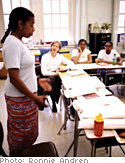
The nursery of P911, a public high school in Harlem for pregnant and parenting mothers, is literally crawling with babies. A dozen tiny faces stop and turn with anticipation toward the teenage moms who enter the room. Amid the confusion, Susan Straub shouts like a cheerleader, "Okay, everyone grab a baby and a book!" The girls collect their wee spawn, curl up in rocking chairs, and get down to business.
Quiet descends upon the room. There is only the smell of buttered farina and the hum of words. A 1-year-old raptly turns the pages of a book; a 6-month-old first tries to "Pat the Bunny," then tries to eat the bunny. No matter. These children are getting something many of their mothers—inner-city girls ages 14 to 18, mostly black and Hispanic, often barely literate themselves—never had: the pleasures of books.
Straub, 57, is the creator and director of the "Read to Me" program, which the high school is offering as one of its parenting courses. Married to novelist Peter Straub and the mother of two children herself, she is a fervent believer in the power of storytelling to change children's lives.
"Art invites identification," Straub says. "We get invited into a story, into the book, and follow the character as he goes through a crisis or a problem which ultimately gets resolved. We learn from him. We gain courage and mastery. I think that's why kids read the same book again and again. They want to figure out, 'How did the kid in the story work out his problem? How can I work out mine?'"
For Straub, raised in an upper-middle-class household in Milwaukee, books were a given. As a social worker for disadvantaged families, she began to realize that often reading was not part of her clients' lives. And that lack, she believed, weakened not only the chances of a baby's future success but also the bond between parent and child. Her "Read to Me" program, conceived in 1988, has been taught in schools and community centers throughout New York City and is currently being tried in other states. Animated and ardent about her subject, Straub is relentlessly hopeful about her students' future.
Straub begins the course by taking Polaroids of each student, "because I want to show them that their faces are the first 'books' their babies read." (And it's true: The littlest children are more interested in Mom's reaction to the book than in the book itself.) In another session, each mother makes her own mini-book by decorating small pieces of stiff cardboard (excellent for chewing) with magazine photos, stenciled letters and stickers; she then hooks the "pages" onto a key ring. Perhaps most meaningful, Straub takes the girls and their children to a local library, where many parents get their first library card.
Straub remembers her own son's passion for The Story of Ferdinand, which he demanded she read over and over. There is a page in the story where Ferdinand smells the flowers as his mother watches from a distance. The text reads: "Sometimes his mother, who was a cow, would worry about him. She was afraid he would be lonesome all by himself. ... [But] his mother saw that he was not lonesome, and because she was an understanding mother, even though she was a cow, she let him just sit there and be happy."
"On that page, my son would take his thumb out of his mouth and say, 'Good.' And I realized that was terribly important to him. I was always a rusher, and he enjoyed things at a different pace. I think he was trying to tell me that if I was a good mother, I would trust him to do things at his own speed. Which I learned to do." The point, Straub insists, is that by reading to your child "you are not only teaching him, you are learning about him."
What You Can Do
Straub remembers her own son's passion for The Story of Ferdinand, which he demanded she read over and over. There is a page in the story where Ferdinand smells the flowers as his mother watches from a distance. The text reads: "Sometimes his mother, who was a cow, would worry about him. She was afraid he would be lonesome all by himself. ... [But] his mother saw that he was not lonesome, and because she was an understanding mother, even though she was a cow, she let him just sit there and be happy."
"On that page, my son would take his thumb out of his mouth and say, 'Good.' And I realized that was terribly important to him. I was always a rusher, and he enjoyed things at a different pace. I think he was trying to tell me that if I was a good mother, I would trust him to do things at his own speed. Which I learned to do." The point, Straub insists, is that by reading to your child "you are not only teaching him, you are learning about him."
What You Can Do
- Read To Me can use volunteers, children's books and monetary contributions. You can also start your own Read to Me program. Website: www.readtomeprogram.org PH: 877-787-7323




